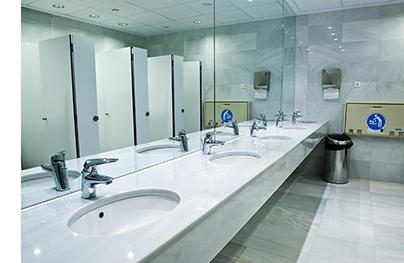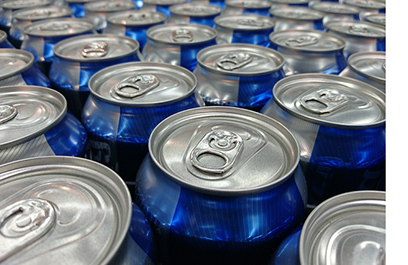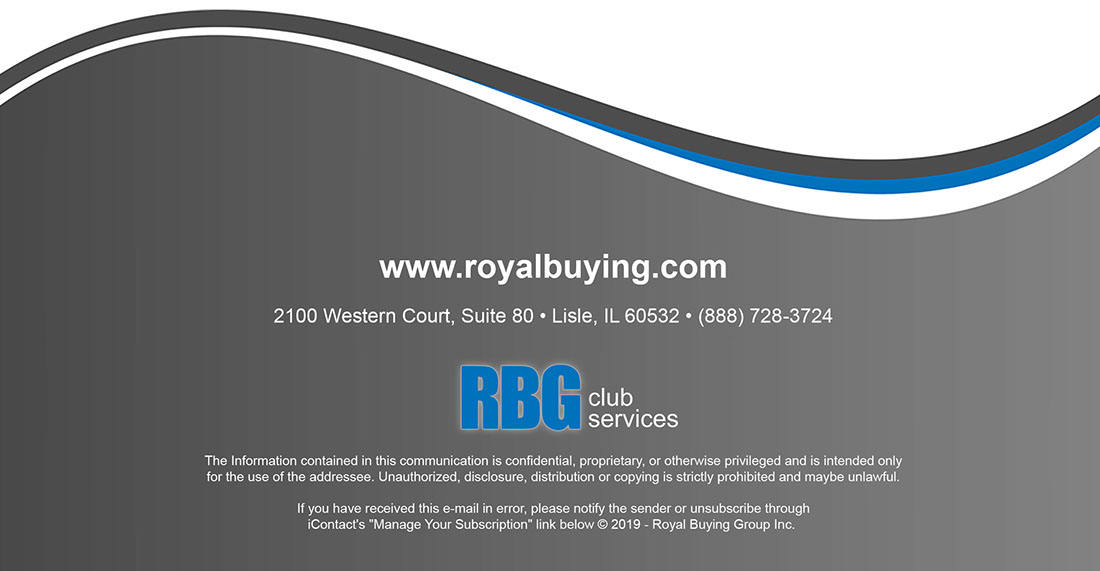
Consumers Spend More at Establishments with Clean Restrooms
C-Stores That Focus on Restroom Cleanliness Should See an Increase in Sales.
March 2018
 A recent study called "Healthy Hand Washing Survey" by Bradley, reported that almost half of American's will "definitely" or "probably" spend more money at a business that has clean, well-maintained restrooms. Also, approximately 60% of Americans can make a conscious decision to visit a specific business because they know it has nice restrooms.
A recent study called "Healthy Hand Washing Survey" by Bradley, reported that almost half of American's will "definitely" or "probably" spend more money at a business that has clean, well-maintained restrooms. Also, approximately 60% of Americans can make a conscious decision to visit a specific business because they know it has nice restrooms.
According to Jon Dommisse, director of strategy and corporate development for Bradley, "The inherent correlation between restroom conditions, businesses and customers extends even deeper than we realized. Our survey has previously highlighted how well-maintained restrooms increase patronage; learning that people also reward these businesses with their spending power was further confirmation of how customers respond positively to clean restrooms."
When it comes to restaurants, the judgement on the condition of restrooms is much more touch, as 82% think a restaurant with dirty restrooms is "extremely" or "fairly" likely to have a dirty kitchen. In addition, out of all types of facilities, restaurants and health care establishments cause American's the most concern about workers not washing their hands.
The survey also shows that when businesses let restroom maintenance slip through the cracks, they're at a high risk of jeopardizing customer satisfaction and sales. "More than half of Americans say they are unlikely to return to a business after experiencing a poorly maintained restroom," Dommisse said. "Others will complain to management, tell a friend of leave right away without completing their business."
That means more businesses may be on shaky ground with customers since 70% of Americans report having an unpleasant restroom experience - a number that has increased from 50% over the past three years. In fact, 42% said they had a bad experience within just the past two months. When asked about the biggest pain points in restrooms, the following circumstances as "extremely" or "very" aggravating:
- 83% - Toilet clogged or not flushed
- 78% - Toilet paper dispenser empty or jammed
- 74% - Partition doors don't latch
- 73% - Unpleasant smells
- 72% - Overall appearance is old, dirty or unkempt
Top restroom frustrations include having to walk across a wet floor, reaching over someone to access soap and waiting in line for a hand dryer. The survey also delved into perceptions about this year's flu season. Almost 60% of Americans are "extremely" or "quite" concerned about contracting a new or resilient strain of the flue. This elevated concern appears to prompt more diligent hand washing, as 65% of American's say they wash their hands more frequently ore more thoroughly to avoid getting germs of passing them on to others. Per a May 2017 NACS consumer survey, 75% of travelers said they would use a convenience store bathroom when fueling up on trips, a 5-point jump from 2016.
SOURCE: Dirty Bathrooms: What Nightmares Are Made Of. NACS Daily News. March 12, 2018. http://www.convenience.org/Media/Daily/Pages/ND0312182_Dirty-Bathrooms-What-Nightmares-Are-Made-Of_Operations.
What Does the New Aluminum Tariff Mean for Beverage Makers?
Manufacturers say Trump's Plan Will Mean Layoffs and Increased Costs.
March 2018
 President Trump's proposed tariff on foreign steel and aluminum caught many businesses off guard, however the most surprising result could be that the tax will likely raise the cost of beer, carbonated soft drinks and other beverages in the United States.
President Trump's proposed tariff on foreign steel and aluminum caught many businesses off guard, however the most surprising result could be that the tax will likely raise the cost of beer, carbonated soft drinks and other beverages in the United States.
On March 1, Trump said that his administration will impose a 25% tariff on steel imports and a 10% tariff on aluminum. At the heart of the looming trade action is Trump's campaign promise to create jobs in the United States, particularly in factories, by getting tough on trade, according to a CNN report.
Both metals are crucial raw material for automobiles, airplanes and appliance that are made in the U.S. However, this tariff is probably going to increase prices on food and drinks packaged in aluminum which has caused alarm for the beverage industry.
"Like most brewers, we are selling an increasing amount of our beers in aluminum cans, and this action will cause aluminum prices to rise and is likely to lead to job losses across the beer industry," Molson Coors Brewing Co., Denver, said in a statement. "American workers and American consumers will suffer as a result of this misguided tariff.
Anheuser-Busch Inc., St. Louis, expressed similar concerns. "Because beer is increasingly packaged in aluminum cans, the proposed 10% tariff on aluminum will likely cost U.S. brewers millions of dollars, making it more difficult to grow and further invest in our U.S. operations," the company stated. "We urge the administration to consider the impact of these decisions on thousands of hard-working Americans and millions of beer drinkers that make up the U.S. beer industry."
An industry group called The Beer Institute said the 10% aluminum tariff would result in the loss of 20,300 jobs at bars, breweries and every task in between, according to CNN. It also cited an analysis from John Dunham & Associates, an economic consulting firm in New York.
Many other major beverage makers - Coca Cola, PepsiCo, Inc., Dr Pepper Snapple Group and beer importer Constellation Brands, issued a letter to the president on February 1st in anticipation of the tariffs, according to a report by The Street. In it, they stated that the "tariffs or quotas on imports of primary aluminum would have a major negative impact on downstream U.S. manufacturers like food and beverage companies."
With Trumps announcement of these tariff's last week, he exempted some countries from it to avoid hurting American allies and easy the burden on U.S. Manufacturers that use the metals.
SOURCES: Holts, Steve. Beverage Makers Wince at Aluminum Tariff. CSP Daily News. March 2, 2018. http://www.cspdailynews.com/category-news/beverages/articles/beverage-makers-wince-aluminum-tariff

